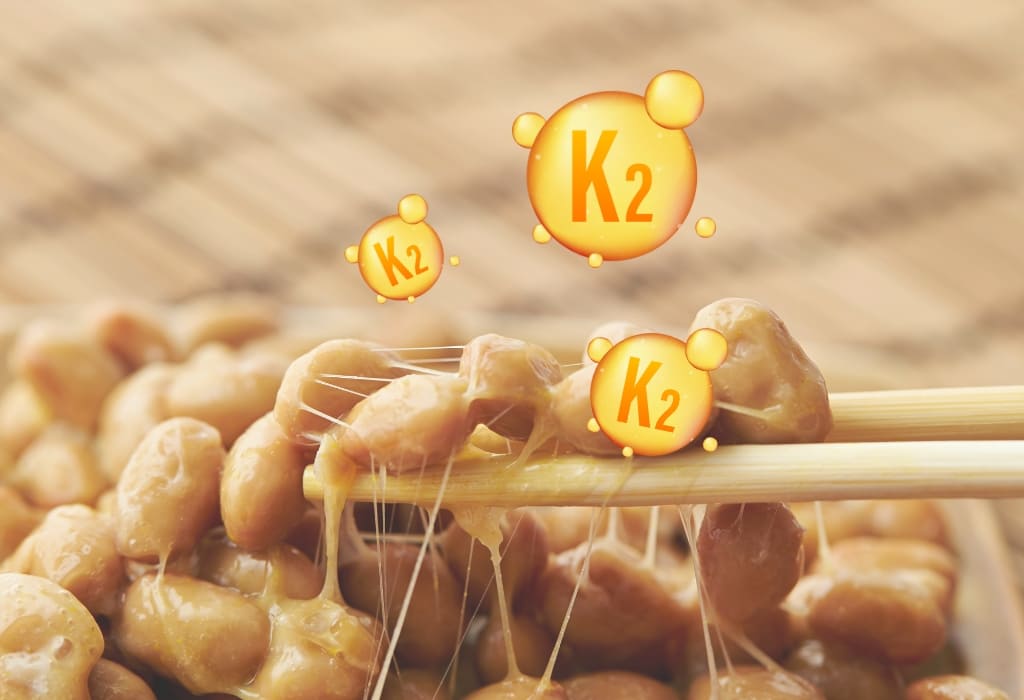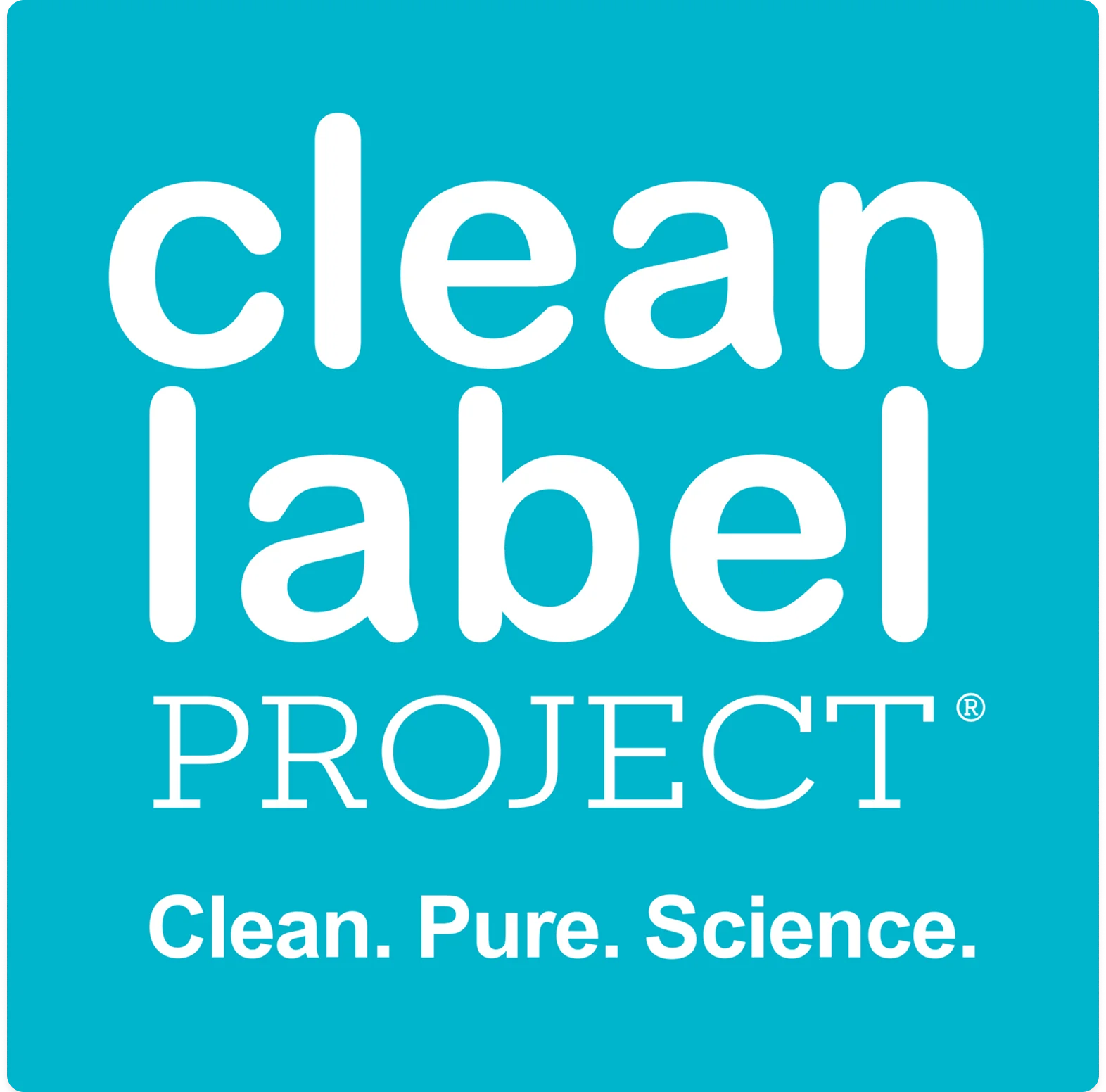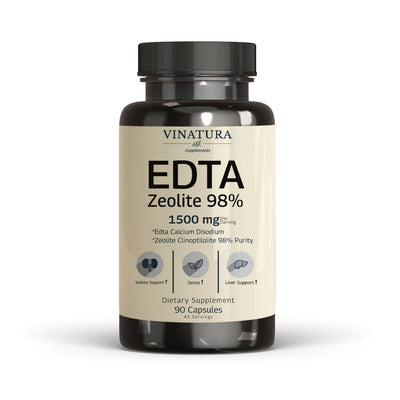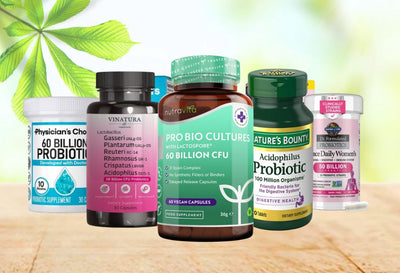
Nattokinase vs Vitamin K2: Why They Don’t Go Together
Nattokinase and Vitamin K2 may come from the same food—natto—but they serve very different roles. While natto naturally contains high levels of Vitamin K2, most nattokinase supplements have it removed.
This is because Vitamin K2 supports blood clotting, while nattokinase promotes clot breakdown. In this article, we’ll break down what each does, why they don’t always go together, and how to choose the right one for your health goals.
Before exploring further, please read the disclaimer located at the end of this webpage.
Key Takeaways
- Nattokinase and Vitamin K, specifically Vitamin K2, are two components found in Natto—a traditional Japanese food made from fermented soybeans.
- Nattokinase does not contain Vitamin K2.
- Vitamin K2 is removed from Nattokinase due to their different mechanisms of action concerning blood clotting.
- Natto contains over 880 mg of Vitamin K2 per 100g.
- It is possible to use Nattokinase and Vitamin K2 supplements together, but their roles in blood clotting should be understood—especially for those on anticoagulant medication.
Is Nattokinase The Same As Vitamin K2?
The table below highlights their key differences in source, function, health benefits, and why they are often used separately in supplements.
|
Criteria |
Nattokinase |
Vitamin K2 (MK-7) |
|
Source |
Enzyme produced during the fermentation of natto |
Naturally present in natto, especially in the MK-7 form |
|
Main Function |
Dissolves blood clots; supports lipid regulation |
Supports blood clotting and bone health |
|
Potential Benefits |
May reduce risk of heart disease and arterial plaque [1,3] |
May help limit osteoporosis [4] |
|
Mechanism of Action |
Breaks down fibrin, a protein involved in clot formation |
Activates proteins that regulate calcium deposition in bones and arteries |
|
Health Focus |
Cardiovascular support |
Bone and vascular health |
|
Combination Note |
Typically used alone in supplements to avoid interference with Vitamin K2’s clotting role |
Often excluded from nattokinase formulas to prevent opposing effects |
Why Is Vitamin K2 Removed from Nattokinase?
Vitamin K2 is often excluded from nattokinase supplements as a precaution for individuals taking prescription anticoagulants like warfarin [6].
This practice is based on the fact that vitamin K—particularly K1—can reduce the effectiveness of blood-thinning medications, not because vitamin K2 and nattokinase interact harmfully [8,9].
The confusion may arise from this medical guideline, leading some to believe that vitamin K2 and nattokinase are incompatible. However, this concern applies specifically to drug interactions, not to nattokinase itself.
For healthy individuals not on anticoagulant therapy, combining vitamin K2 and nattokinase is generally considered safe, and may even provide synergistic cardiovascular benefits (Chen et al., 2022).
Can You Take Nattokinase and Vitamin K2 Together?
If you are taking prescription anticoagulants (such as warfarin), adding vitamin K (especially K1 or K2) may reduce the drug’s effectiveness.
Therefore, vitamin K supplements should be avoided in this case — the issue lies with the medication, not with nattokinase.
For healthy individuals, there is no scientific evidence showing that nattokinase and vitamin K2 are incompatible or harmful when taken together.
However, individual responses may vary depending on personal health status. Always consult a healthcare professional before starting any new supplement, especially if you have underlying conditions or take medication.
Read the product label carefully and follow usage instructions as directed.
The Relationship Of Vitamin K2 And Nattokinase

Vitamin K2 and nattokinase serve distinctly different roles in the body.
Nattokinase is a fibrinolytic enzyme that helps break down fibrin, a protein responsible for blood clot formation. This action promotes smoother blood flow, supports cardiovascular function, reduces inflammation, and offers protection against oxidative stress.
On the other hand, vitamin K2, especially in its MK-7 form, plays a central role in calcium metabolism. It guides calcium to where it's needed—such as bones and teeth—while preventing unwanted deposits in the arteries. This precise calcium regulation is crucial for both bone strength and long-term vascular health.

Does Nattokinase Contain Vitamin K2?
Nattokinase in its purified supplement form does not contain vitamin K2. Although both Nattokinase and Vitamin K2 are naturally found in Natto and other products fermented with B. subtilis [2], they are separated during the manufacturing of Nattokinase supplements.
This separation is done to avoid their opposing effects on blood clotting. However, if you eat Natto directly, you will consume both Nattokinase and Vitamin K2. It's important to note that the amount of Vitamin K2 can vary in different Natto products, so it's a good idea to check the nutritional label if you are specifically looking for this vitamin.
How Much Vitamin K2 Is In Natto?
It has been reported that Natto contains over 880 mg of Vitamin K2 per 100g [4]. This remarkable concentration makes Natto an excellent choice for individuals seeking to enhance their Vitamin K2 intake. However, the actual Vitamin K2 content may vary due to factors such as the fermentation process.
What Supplements Should Not Be Taken With Nattokinase?
Nattokinase may interact with blood thinners and other anticoagulant medications such as aspirin or ibuprofen.
Although there is currently no formal research specifying which supplements should be avoided when taking nattokinase, it’s important to exercise caution based on user experiences and known interactions.
Certain substances—like aspirin, ginkgo, or cardiovascular medications—can affect blood clotting when combined with nattokinase.
Keep in mind that these are general recommendations, and individual responses may vary. It’s always best to consult a healthcare professional before starting any new supplement.

What Should Vitamin K2 Not Be Taken With?
Caution should be exercised when using Vitamin K2 with certain medications, as they may interfere with its effectiveness.
The medicines include antacids, blood thinners, antibiotics, aspirin, and drugs prescribed for cancer, seizures, high cholesterol, and various other conditions.
Conclusion
Whether you're choosing a supplement or exploring traditional foods like Natto, understanding how Nattokinase and Vitamin K2 work can help you make smarter, safer decisions for your health.
If you’re unsure which is right for you, consult a healthcare provider and always check supplement labels carefully.
You may also like:
- 7 Best Nattokinase Supplements for Cardiovascular Health
- Can You Take NAC Nattokinase and Bromelain Together?
- How Much Nattokinase Per Day Should You Take?
References
- [1] Gasmi, A., et al. (2021). Phosphocalcic metabolism and the role of vitamin D, vitamin K2, and nattokinase supplementation. Critical Reviews in Food Science and Nutrition, 62(25), 7062–7071. https://doi.org/10.1080/10408398.2021.1910481
- [2] Wang, H., et al. (2019). Improvement of menaquinone-7 production by Bacillus subtilis natto in a novel residue-free medium by increasing the redox potential. Applied Microbiology and Biotechnology, 103(18), 7519–7535. https://doi.org/10.1007/s00253-019-10044-5
- [3] Xu, B., et al. (2022).
- [4] Yanagisawa, Y., & Sumi, H. (2005). Natto Bacillus Contains A Large Amount Of Water-Soluble Vitamin K (Menaquinone-7). Journal of Food Biochemistry, 29(3), 267–277. https://doi.org/10.1111/j.1745-4514.2005.00016.x
- [5] Straight Talk About Soy. (2018, August 6). The Nutrition Source. https://nutritionsource.hsph.harvard.edu/soy/
- [6] Jensen, G., et al. (2016). Consumption of nattokinase is associated with reduced blood pressure and von Willebrand factor, a cardiovascular risk marker: results from a randomized, double-blind, placebo-controlled, multicenter North American clinical trial. Integrated Blood Pressure Control, 9, 95–104. https://doi.org/10.2147/ibpc.s99553
- [7] Chen, H., et al. (2022). Effective management of atherosclerosis progress and hyperlipidemia with nattokinase: A clinical study with 1,062 participants. Frontiers in Cardiovascular Medicine, 9. https://doi.org/10.3389/fcvm.2022.964977
- [8] Muric, M., et al. (2024). Comparative Cardioprotective Effectiveness: NOACs vs. Nattokinase—Bridging Basic Research to Clinical Findings. Biomolecules, 14(8), 956–956. https://doi.org/10.3390/biom14080956
- [9] Jensen, G., et al. (2016). Consumption of nattokinase is associated with reduced blood pressure and von Willebrand factor, a cardiovascular risk marker. Integrated Blood Pressure Control, 9, 95–104. https://doi.org/10.2147/ibpc.s99553
Testimonial Disclaimer
*The testimonials presented on this website are provided by individuals based on their personal experiences with our products. These testimonials represent individual opinions and experiences, which may not be typical or applicable to all users of our products. Results may vary depending on a variety of factors, including individual health, lifestyle, and adherence to product usage instructions.Author

Product Disclaimer
The dietary supplement products mentioned on this website are formulated based on scientific research and adhere to FDA guidelines for dietary supplements. However, the content of the articles has not been evaluated by the Food and Drug Administration (FDA) and is not intended to promote or endorse any specific product. Any products sold on this website are not intended to diagnose, treat, cure, or prevent any disease.
Opinions and Endorsements
Any claims, statements, or opinions expressed in the articles are those of the author(s) and do not necessarily reflect the views or opinions of the manufacturers of the dietary supplement products. The products sold on this website are separate from the content of the articles and are not directly endorsed or associated with the information presented here.
Liability Disclaimer
The author(s) of the articles, website, and manufacturers of the dietary supplement products do not assume any liability for any potential consequences arising from the use of the information provided in the articles. It is recommended that individuals consult with a qualified healthcare professional before making any dietary or lifestyle changes, including the use of dietary supplements.
Product Usage
Please refer to the product labels and packaging for specific usage instructions and guidelines for the dietary supplement products sold on this website.
Customer Support
For any concerns or questions regarding the dietary supplement products, please contact our customer support team, who will be more than happy to assist you.






Leave a Comment
Be the first to comment.
What do you think?